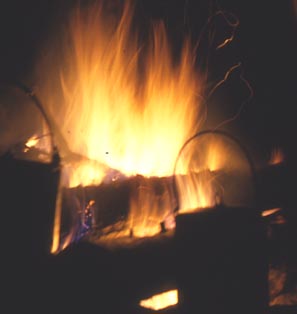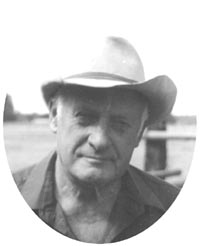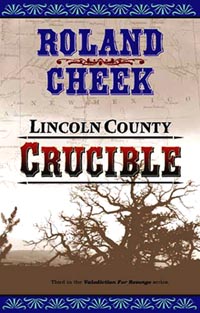a weblog sharing info on outdoor skills and campfire musing by a guy who spends a bunch of time in pursuit of both
CULTURE
WHERE -
TALES ARE TOLD OF
Welcome to Roland Cheek's Weblog
Roland is a gifted writer with a knack for clarifying reality. Looking forward to more of his wisdom
- Carl Hanner e-mail
What is a conservative conservationist? The description I like best is a "Teddy Roosevelt Republican." But I'm not picky, I could go for a "Teddy Roosevelt Democrat" just as easily. My requirements are that he (or she) cares sufficiently about America's future to demonstrate a little fiscal restraint, and practice more environmental concern than recent politicians have manifested. I wouldn't mind, either, if a few trusts got busted along the way.
To access Roland's weblog and column archives
Click Here
Tip o' the Day
Back a week or two ago, my "Tip o' the Day" was to point out how important water, wood, and a bug-free location was to proper campsite selection. At that time, I also mentioned that, if one were traveling with horses, a fourth requirement should be added: feed for the ponies. Today I'd like to visit that requirement in more detail:
We'll assume you're traveling in wilderness or backcountry where grazing is permitted. (If you must pack all your own horsefeed, then we must discuss a different set of circumstances.) But let's consider that we're riding, say, into a meadow that appears to have abundant grass for grazing. There's a creek tumbling down from nearby hills which, translated, means there's plenty of water. It's late afternoon; a campsite beckons from each end of the meadow. Which do you choose?
Take the first one you come to. Why? Because you want to have your camp between where your ponies are grazing and their backtrail. You see, when a horse fills its belly it looks around for home. If, in fact, he actually heads for home, you want to be able to intercept him. Camp on the far end of your meadow and you might figure on going for a long hike after your homeward-bound steeds.
You can, of course, handle the occasion differently. You can use hobbles, stake them out, or toggle 'em to a drag log. I use hobbles. And to insure their presence, I'll only turn half of the ponies out at one time, breaking up the buddies -- one tied, one loose.
Even than my trust is short. If more than one of the loose horses raises his head to look back the way he came, I know their bellies are filled and they're looking for mischief -- like leaving for distant places. Understand, I don't mind walking to distant places, but I want the decision to be mine alone. When a horse raises its head to stare at the skyline is when it's time to bring him to the hitchline.
About two hours on good grass will fill ponies for the short haul. Bring 'em in, tie 'em up, then turn 'em out again in three or four hours.
Yeah, it's a hassle. But take my word for it, it's not nearly as much of a hassle a traipsing 20 miles to find your ponies standing at the barn switching flies.
Ethan Lester, the 13-year-old Camarillo, California lad who exchanges e-mails not only says his younger brother is hooked on my Valediction For Revenge Western series, but now he says:
"My dad and my grandma just started reading your books and they love them. Whenever my grandma is over that's all she talks about Jethro and Susan."
The Valediction For Revenge series that Ethan's brother, dad and grandma is reading begins with Echoes of Vengeance
NO LACK OF HOPE . . . OR OPPORTUNITY
I was born in the middle of the Great Depression. If ever a generation could be accused of being star-crossed lucky, it's mine. Mine, you see, is the first generation in history ever to have abundant hope and copious opportunity at the very fingertips of all its people.
Hope has always beeen present in America. From history's Plymouth Puritans to yesterday's Hi-Line Norwegians, hope thudded within their breasts, even as the elements combined to drive them to despair. At least there was that--where they came from, there was no hope. Hope was the Eveready Batter that keeps on going; a bridge to the future.
Without hope how could one ever leave an Appalachian coal mine, perhaps the only thing he ever knew? Without hope what was the alternative: daily risk of life and limb from mine explosion, tunnel collapse, or oxygen suffocation. Or die of black lung disease before age forty. Without hope what was the alternative for a shoe factory cobbler in Boston? Dailight to dark, six days per week, at starvation wages; to die of consumption at age thirty-seven. Hope was all a family had when they walked from a coal mine town with every possession they owned on their backs. Or wrapped in a tablecloth slung over the shoulder.
At least in America they could walk away in hopes of something better. There was no such similar hope in Europe or Asia, only in America--and often, little enough then. What cruel joke to free a Cornishman from Cornwall coal to cast him down a mine shaft in Butte. Or to lift a starving young man from the fjords of Norway, only to plunk him down north of Havre, miles from water. All those people--men and women--could possibly have had going for them was a willingness to work and--God forbid--the certain knowledge that no matter how bad they found their present, it wasn't as rotten as their past.
My father left Texas for the Pacific Northwest in 1940. My wife's father left Arkansas for Oregon in 1949. They started 600 miles and ten years apart, and wound up next-door neighbors while Jane and I flushed from childhood. But the point is, neither Jane's father nor mine had anything to go on but hope. Yes, they found a better life. But had they not, they still would've lived whatever life they had because they had no other choice. They left stagnation and destitution on the wings of hope. And hope, by God, fulfilled their dreams.
My generation, on the other hand, has been signally fortunate in having both hope and opportunity for multiple choices. I left fine employment in Oregon to seek adventure in Montana. I left fine Montana employment to seek even greater adventure at wilderness's gate. I left a successful career as a Montana outfitter to pursue a writing career.
Those kinds of options were not open to plebian folks of prior generations. America's dream has always allowed one single, hopeful throw of the dice. But only for recent generations has opportunity so joined hope that if one desires, one can pull out a chair in one game, look at the cards, then go on to another game if he wishes. That, you see, is the greates realization of the American Dream--that our nation is so economically strong that ordinary, run-of-the-mill citizens have more than one shot at the brass ring on the merry-go-round of life.
That's why I tend to be puckish toward folks who feel life dealt them a hand from the bottom of the deck and, thus, want everyone else to stake their continuing entry into destiny's sweepstakes.
Lack of hope? Lack of opportunity? In America? Surely you jest!
Roland Cheek wrote a syndicated outdoors column (Wild Trails and Tall Tales) for 21 years. The column was carried in 17 daily and weekly newspapers in two states. In addition, he scripted and broadcast a daily radio show (Trails to Outdoor Adventure) that aired on 75 stations from the Atlantic seaboard to the Pacific Ocean. He's also written upwards of 200 magazine articles and 12 fiction and nonfiction books. For more on Roland, visit:
www.rolandcheek.com
Recent Weblogs
Tuesday, March 11, 2008
for more info about these and other Roland Cheek books
There's a bunch of specific info about Roland's books, columns, and archives. By clicking on the button to the left, one can see Roland's synopsis of each book, read reviews, and even access the first chapter of each of his titles. With Roland's books, there's no reason to buy a "pig in a poke."
for detailed info about each of Roland's books
Read Reviews
Read their first chapters
For interested educators, this weblog is especially applicable for use in history, economic, and government classes, as well as for journalism students.
Roland, of course, visits schools. For more information on his program alternatives, go to:
Books 2 & 3 are set amid New Mexico's violent Lincoln County War
Book four in the Valediction For Revenge series, Gunnar's Mine, is set in Colorado mining country, as is the sixth and final book in the series, The Silver Yoke
Book five in the series is Crisis On the Stinkingwater, and it's set around present-day Cody, in what is now called the Shoshone River Country
I knew you were a good writer, but I never before put you in the class of Michener and Clancy. You spin a good yarn and don't let it drop for a minute. You handle dialogue extremely well, and the action scenes are outstanding. You have no reason to venture so carefully into the world of novelists.
- Jack Oliver / Pittsburgh, PA
Montana's Bob Marshall Wilderness is a coffee table book about the magnificent chunk of wild country I roamed
to send this weblog to a friend
to tell Roland what you think of his Campfire Culture weblog
source links for additional info
to visit Roland's newspaper columns and weblog archives
NEXT WEEK:
TREASURE STATE CULTURE
www.campfireculture.com









